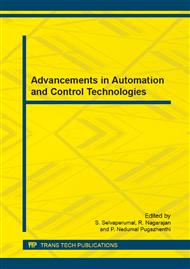p.223
p.229
p.235
p.242
p.248
p.254
p.260
p.267
p.273
Design of Specification Oriented Compensator with a PID Controller for Load Frequency Control
Abstract:
This paper proposes a design of Specification Oriented Compensator (SOC) with a Proportional Integral Derivative (PID) controller for Load frequency Control (LFC) in a thermal power system. The phase margin which is derived from the computationally tuned response of PID controller is considered as a desirable specification and it is used to design the compensator. The different structures of compensator like lead, lag and lead-lag were first simulated in a single area power system and better results are found in Specification Oriented Lead Compensator (SOLC). The simulation study of two area thermal power system with SOLC is then performed and their frequency deviation and tie-line power deviation characteristics are compared with conventional PID controller, Integral controller and also with a non controller system. The Integral Absolute Error (IAE) and Integration Time Absolute Error (ITAE) are considered as performance indices to scrutinize the system robustness. The simulation studies clearly reveal the superiority of the proposed SOLC with PID controller over others in way of enhanced system transient response, improved the stability and robustness of the system. All the simulations in this paper are performed using Matlab software.
Info:
Periodical:
Pages:
248-253
DOI:
Citation:
Online since:
June 2014
Authors:
Price:
Сopyright:
© 2014 Trans Tech Publications Ltd. All Rights Reserved
Share:
Citation:


